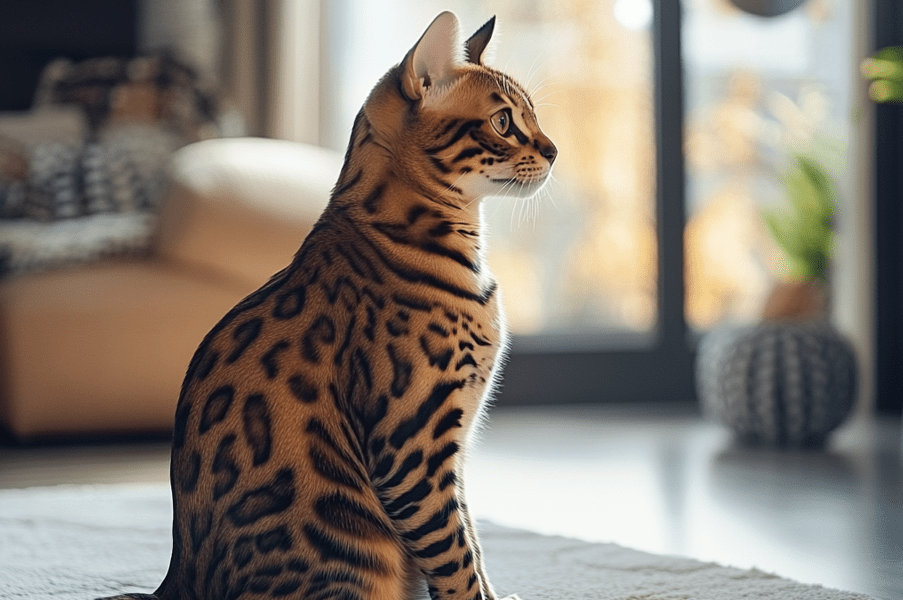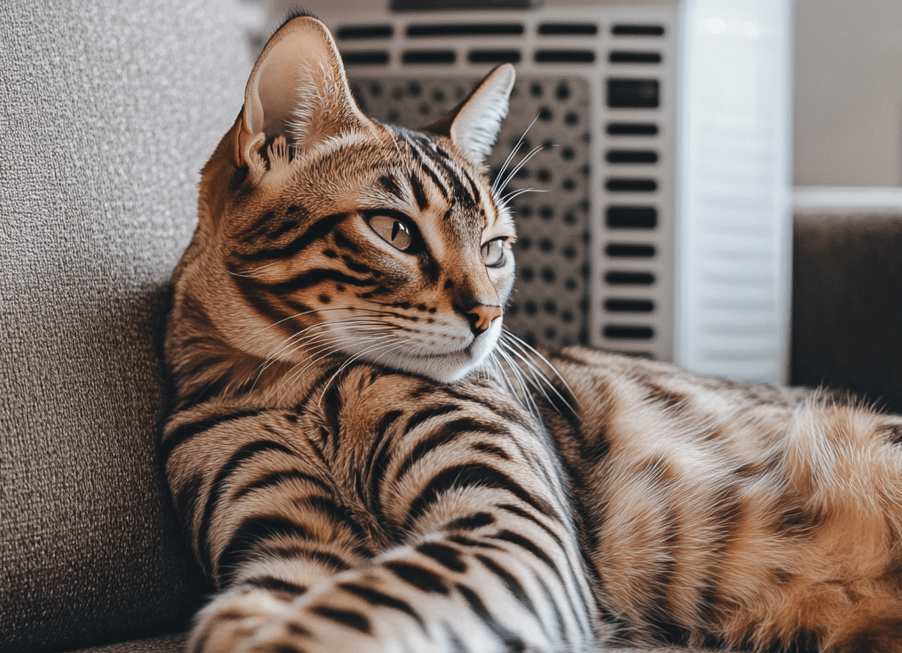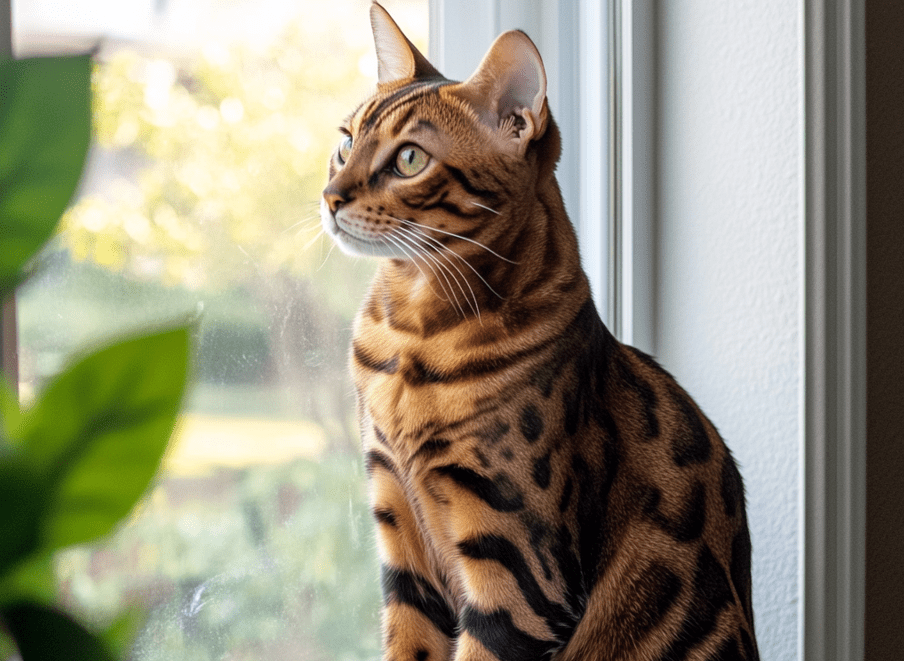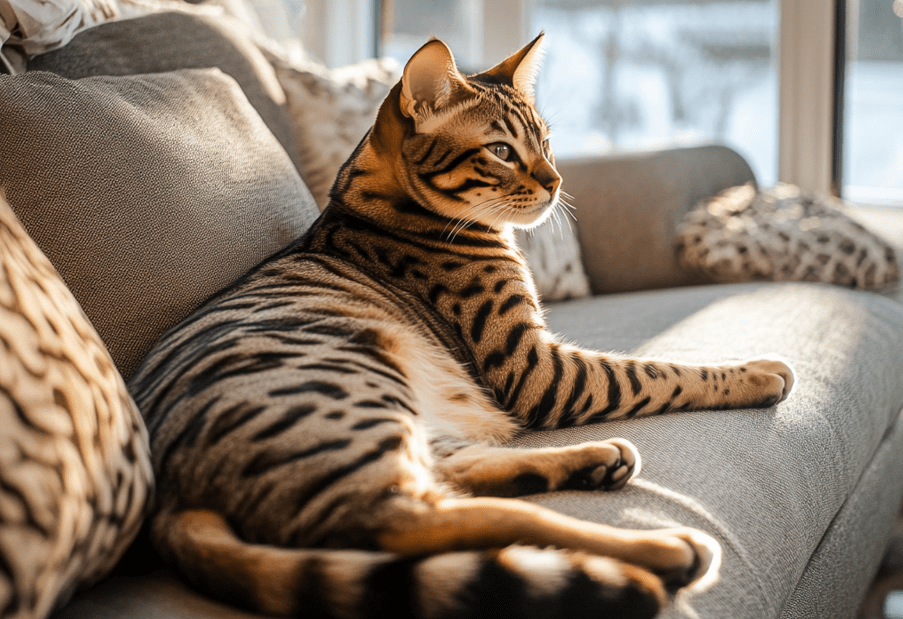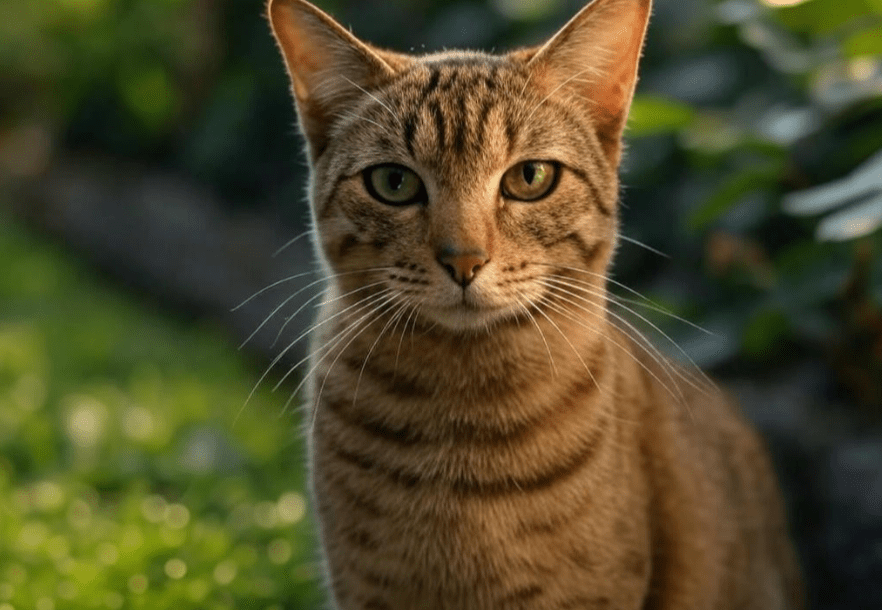
Bengal cats are known for their striking appearance, playful demeanor, and energetic personality, making them a beloved breed among cat owners. However, like all pets, your Bengal cat may occasionally experience minor health issues that can cause discomfort. While veterinary care is essential for serious conditions, many minor ailments can be managed at home using natural remedies for Bengal cats. This comprehensive guide explores safe, effective, and natural solutions to help your Bengal cat feel their best, ensuring they thrive in a healthy and happy environment.
Understanding Minor Health Issues in Bengal Cats
Before diving into natural remedies, it’s important to understand the common minor health issues that Bengal cats may face. Bengals are generally healthy, but their active nature and unique genetics can make them prone to certain conditions. Some of these minor issues include:
Skin Irritations: Bengals may experience dry skin, mild allergies, or irritation from environmental factors.
Digestive Upsets: Occasional vomiting, diarrhea, or constipation can occur due to dietary changes or stress.
Minor Wounds or Scratches: Their playful and adventurous behavior can lead to small cuts or abrasions.
Ear Mites or Wax Buildup: Bengals can develop ear issues, especially if they spend time outdoors.
Stress or Anxiety: Changes in routine or environment can cause mild anxiety in these sensitive cats.
While these issues are typically not severe, addressing them promptly with natural remedies can prevent them from escalating and keep your Bengal cat comfortable.
Why Choose Natural Remedies for Your Bengal Cat?
Natural remedies offer a gentle, holistic approach to managing minor health issues in Bengal cats. Here are a few reasons why they’re a great choice:
Fewer Side Effects: Unlike some medications, natural remedies are less likely to cause adverse reactions when used correctly.
Support Overall Wellness: Many natural remedies promote general health, such as boosting the immune system or improving coat quality.
Cost-Effective: Ingredients for natural remedies are often affordable and readily available.
Complementary to Veterinary Care: Natural remedies can be used alongside vet-recommended treatments for a well-rounded approach.
However, it’s crucial to consult your veterinarian before trying any new remedy, especially if your Bengal has underlying health conditions or is on medication.
Natural Remedies for Common Minor Health Issues in Bengal Cats
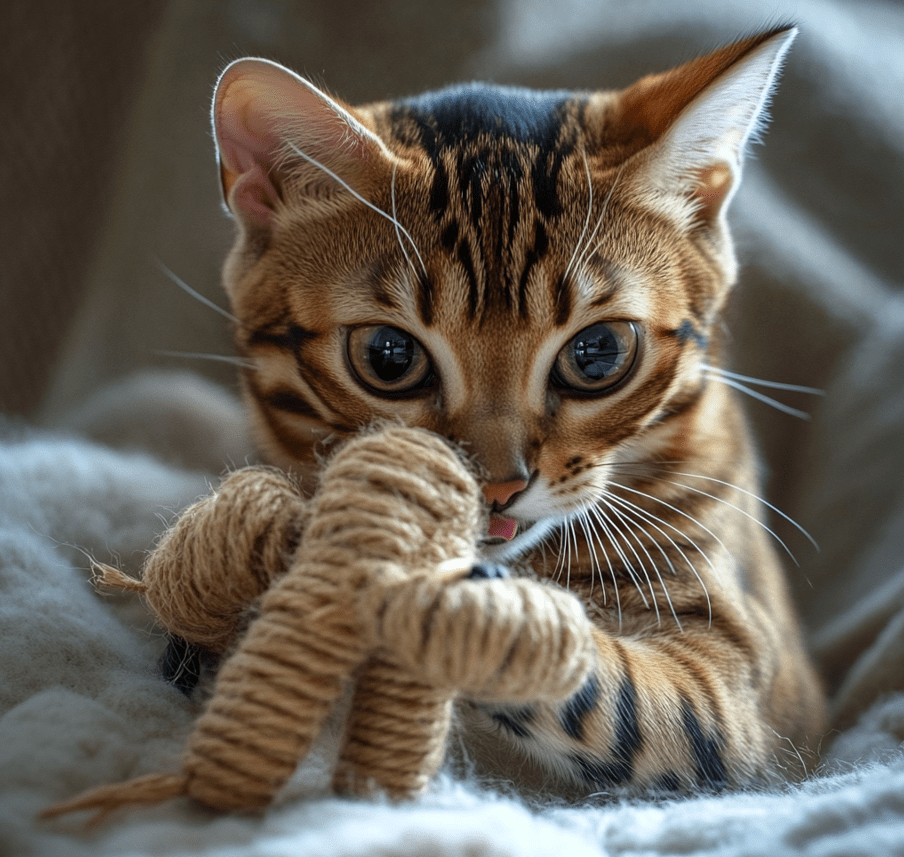
Below, we’ll explore natural remedies tailored to address the most common minor health issues in Bengal cats. Each remedy is safe, vet-approved, and easy to implement at home.
1. Soothing Skin Irritations and Allergies
Bengal cats can develop skin irritations due to allergies, dry skin, or environmental factors like pollen or dust. Here are some natural remedies to help:
Coconut Oil: Coconut oil is a natural moisturizer with anti-inflammatory and antimicrobial properties. Apply a small amount (about a teaspoon) to your Bengal’s skin to soothe dryness or irritation. Be sure to rub it in well to avoid excess oil on their fur, which they might ingest while grooming.
Oatmeal Baths: Oatmeal has calming properties that can relieve itching and inflammation. Grind plain, unsweetened oatmeal into a fine powder and mix it with warm water to create a paste. Apply the paste to irritated areas, let it sit for 10 minutes, then rinse off gently.
Aloe Vera: Pure aloe vera gel (without additives) can soothe minor skin irritations. Apply a thin layer to the affected area, ensuring your Bengal doesn’t lick it off immediately, as excessive ingestion can cause digestive upset.
Tip: Always monitor your Bengal after applying a remedy to ensure they don’t have an allergic reaction. If irritation worsens, discontinue use and consult your vet.
2. Managing Digestive Upsets
Digestive issues like mild diarrhea, constipation, or vomiting can sometimes occur in Bengal cats, often due to stress, dietary changes, or hairballs. Here are some natural solutions:
Pumpkin Puree: Plain, canned pumpkin (not pumpkin pie filling) is rich in fiber and can help regulate your Bengal’s digestion. For diarrhea or constipation, mix 1–2 teaspoons into their food. It can also help with hairballs by aiding digestion.
Probiotics: Probiotics support a healthy gut microbiome, which is essential for digestion. Look for pet-safe probiotic supplements or add a small amount of plain, unsweetened yogurt (without artificial sweeteners like xylitol) to your Bengal’s diet.
Hydration: Ensure your Bengal has access to fresh, clean water at all times. For mild dehydration from vomiting or diarrhea, you can offer a small amount of electrolyte-rich bone broth (low-sodium, no onion or garlic) to encourage drinking.
Note: If digestive issues persist for more than 24–48 hours or are accompanied by lethargy, loss of appetite, or blood in the stool, contact your veterinarian immediately.
3. Treating Minor Wounds and Scratches
Bengals are active and curious, which can lead to minor cuts or scratches from play or exploration. Natural remedies can help clean and heal these wounds:
Honey: Raw, unpasteurized honey (like Manuka honey) has natural antibacterial and healing properties. Dab a small amount on a clean wound to promote healing and prevent infection. Cover the area with a light bandage if possible to keep your Bengal from licking it off.
Chamomile Tea Rinse: Chamomile has anti-inflammatory and antiseptic properties. Brew a weak chamomile tea, let it cool, and use it to gently rinse the wound. This can help reduce inflammation and clean the area.
Calendula Ointment: Calendula (marigold) is known for its wound-healing properties. Apply a pet-safe calendula ointment to minor cuts or abrasions to speed up recovery.
Important: If a wound appears deep, is bleeding heavily, or shows signs of infection (redness, swelling, or pus), seek veterinary care immediately.
4. Addressing Ear Mites and Wax Buildup
Ear mites and wax buildup can cause discomfort for your Bengal cat, leading to scratching or head shaking. Natural remedies can help clean their ears and manage mild issues:
Coconut Oil for Ear Cleaning: Warm a small amount of coconut oil (just enough to soften it) and use a cotton ball to apply it to your Bengal’s outer ear canal. This can help loosen wax and soothe irritation. Never insert anything deep into the ear canal.
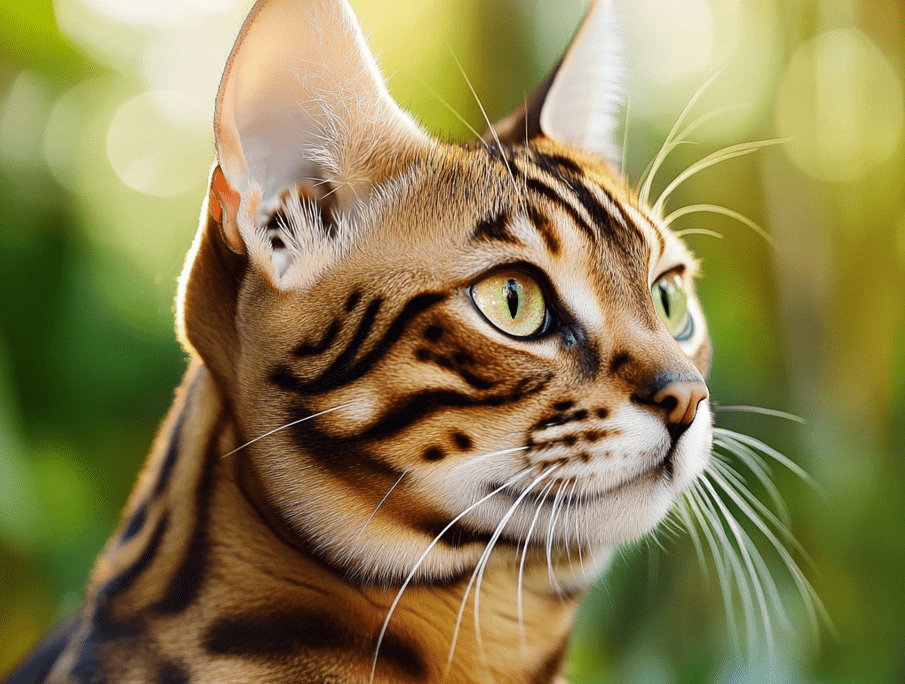
Apple Cider Vinegar Solution: Dilute raw, unfiltered apple cider vinegar with equal parts water. Use a dropper to apply a few drops into your Bengal’s ear, then gently massage the base of the ear. Wipe away debris with a clean cotton ball. This can help with mild ear mite infestations and maintain ear health.
Green Tea Rinse: Brew a weak green tea, let it cool, and use it as a gentle ear rinse to clean debris and reduce inflammation. Green tea has natural antiseptic properties that can help with minor infections.
Caution: If your Bengal shows signs of a severe ear infection (foul odor, discharge, or excessive head tilting), consult your vet, as they may need medicated treatment.
5. Reducing Stress and Anxiety
Bengals are sensitive to changes in their environment, which can lead to stress or anxiety. Natural remedies can help them relax:
Chamomile: Chamomile is a natural calming agent. Brew a weak chamomile tea, let it cool, and add a small amount (1–2 teaspoons) to your Bengal’s water or food. Alternatively, you can use chamomile essential oil in a diffuser (ensure proper ventilation and that your cat can leave the room if needed).
Catnip: Catnip can have a calming effect on some Bengals, while others may become more playful. Offer a small amount of dried catnip or a catnip toy to help reduce stress.
Pheromone Diffusers: Products like Feliway mimic natural cat pheromones to create a calming environment. While not a “remedy” in the traditional sense, they’re a natural way to help your Bengal feel secure.
Tip: Create a safe, quiet space for your Bengal to retreat to during stressful events, like moving or introducing a new pet.
6. Boosting Immunity with Natural Supplements
A strong immune system can help your Bengal cat resist minor health issues. Consider these natural supplements:
Omega-3 Fatty Acids: Fish oil or krill oil supplements can support skin health, reduce inflammation, and boost immunity. Look for pet-safe options and follow the dosage instructions.
Spirulina: This nutrient-rich algae is a natural immune booster. Sprinkle a small amount (as recommended by your vet) into your Bengal’s food to support overall health.
Vitamin E: Vitamin E supports skin and coat health, which can help with minor irritations. You can add a small amount of vitamin E oil to their food, but consult your vet for the correct dosage.
Creating a Holistic Environment for Your Bengal Cat
Beyond specific remedies, creating a holistic environment can help prevent minor health issues in your Bengal cat:
Balanced Diet: Feed your Bengal a high-quality, species-appropriate diet rich in protein, healthy fats, and essential nutrients. Avoid foods with artificial additives or fillers that can cause sensitivities.
Regular Exercise: Bengals are highly active and need plenty of playtime to stay physically and mentally healthy. Interactive toys, climbing trees, and puzzle feeders can keep them engaged.
Clean Living Space: Keep your Bengal’s environment clean by regularly washing their bedding, vacuuming, and ensuring their litter box is scooped daily. A clean space reduces the risk of skin irritations or parasite infestations.
Hydration: Encourage your Bengal to drink water by providing a cat fountain (many Bengals prefer running water) and adding wet food to their diet.
Safety Considerations When Using Natural Remedies
While natural remedies are generally safe, there are important precautions to keep in mind:
Consult Your Vet: Always check with your veterinarian before introducing a new remedy, especially if your Bengal is on medication or has a chronic condition.
Avoid Toxic Ingredients: Some natural substances, like certain essential oils (e.g., tea tree oil), are toxic to cats. Research thoroughly and use only pet-safe options.
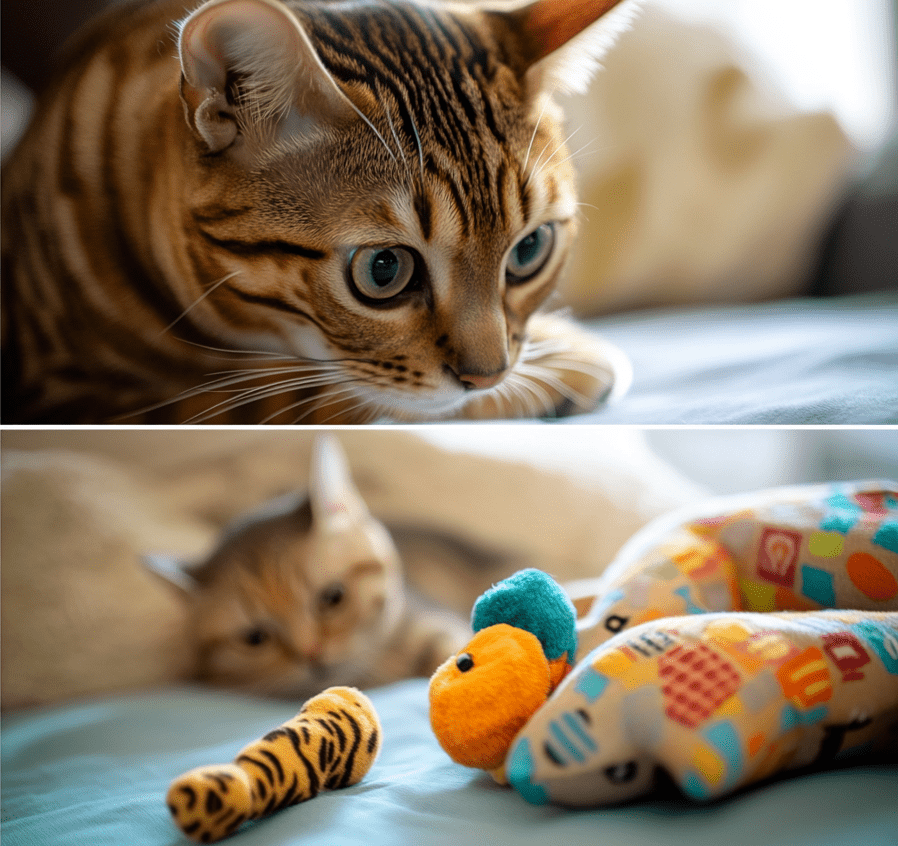
Monitor for Reactions: Watch your Bengal for signs of allergic reactions, such as vomiting, diarrhea, or skin redness, after using a new remedy.
Don’t Ignore Serious Symptoms: Natural remedies are best for minor issues. If your Bengal shows signs of a serious condition (e.g., persistent vomiting, lethargy, or difficulty breathing), seek veterinary care immediately.
Common Myths About Natural Remedies for Cats
There are several misconceptions about using natural remedies for Bengal cats. Let’s debunk a few:
Myth 1: All Essential Oils Are Safe for Cats
Many essential oils, such as tea tree, eucalyptus, and citrus oils, are toxic to cats. Always use cat-safe oils and dilute them properly, with guidance from your vet.
Myth 2: Natural Remedies Can Replace Veterinary Care
While natural remedies are great for minor issues, they’re not a substitute for professional veterinary care. Always consult your vet for serious health concerns.
Myth 3: More Is Better
Overusing natural remedies, such as applying too much coconut oil or giving excessive supplements, can cause issues like digestive upset or skin irritation. Follow recommended dosages carefully.
When to Seek Veterinary Care
While natural remedies can manage minor health issues, there are times when you should consult a veterinarian:
-
If symptoms persist or worsen after 24–48 hours of using a natural remedy.
-
If your Bengal shows signs of a serious condition, such as difficulty breathing, severe vomiting, or sudden behavioral changes.
-
If you suspect an allergic reaction to a remedy (e.g., swelling, excessive scratching, or lethargy).
Your vet can provide a proper diagnosis and recommend the best treatment plan for your Bengal cat.
Conclusion: Supporting Your Bengal Cat’s Health Naturally

Using natural remedies for minor health issues in Bengal cats is a safe and effective way to support their well-being. From soothing skin irritations with coconut oil to managing stress with chamomile, these remedies can help your Bengal feel their best without relying solely on medications. By combining these natural solutions with a healthy diet, regular exercise, and a clean environment, you can ensure your Bengal cat thrives.
Bengal cats bring so much joy with their playful and affectionate nature—it’s our responsibility to keep them healthy and happy. With the natural remedies and tips outlined in this guide, you’ll be well-equipped to address minor health issues and provide the best care for your feline companion.

